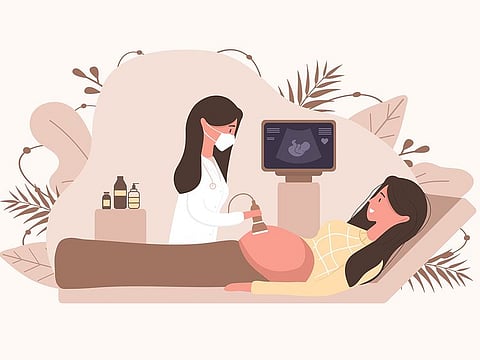Pregnancy health: What is a healthy endometrial lining?
The lining of the womb plays a vital part in foetal health and success

If you are looking to prep for an In vitro fertilization (IVF) procedure or even go the natural route, you can aid your chances for successful pregnancy by keeping an eye on womb health. This is what you need to know about the endometrial lining.
What exactly is the relationship between menstruation and endometrial lining?
Quite a lot actually. The female body sheds the lining of the uterus or the endometrial lining every cycle – this process is termed menstruation. The thickness of the lining varies depending on the time of month and is affected by the levels of oestrogen and progesterone in your system.
Dr Usha Kiran, Consultant Obstetrics and Gynaecologist Laparoscopic Surgeon, Prime Hospital, explains: “During the reproductive age, when a woman is having her periods, the endometrial lining will start growing right after the period and will grow to the maximum just before the period. It can range anywhere from 6mm to 25 to 28mm. During the period, it sheds.”
During the reproductive age, when a woman is having her periods, the endometrial lining will start growing right after the period and will grow to the maximum just before the period. It can range anywhere from 6mm to 25 to 28mm.

What does this lining have to do with pregnancy?
Dr Shreelatha Gopalakrishnan, Obstetrician-Gynecologist and IVF Specialist at Orchid IVF, explains: “Just before ovulation, the functional layer of the endometrium goes through specific changes. Structures called uterine glands become longer and tiny blood vessels proliferate making the endometrial lining thicker and enriched so that it's ready to receive a fertilised egg and also support a placenta—the organ that develops during pregnancy to supply a foetus with oxygen, blood, and nutrients.” If it’s too thin, the fertilised egg or zygote will not be able to attach to the womb; the pregnancy will not continue.
What is a normal, healthy lining thickness?
Dr Dimitrios Kafetzis, Medical Director at Orchid IVF, says: “Multiple studies have shown a correlation between pregnancy and endometrial thickness. A healthy uterine lining must be at least 6- 8mm for the effective implantation of a foetus, although pregnancies have been reported with 4 and 5mm of endometrial thickness. However, the right balance significantly increases the chances of a successful pregnancy.”
Dr Gopalakrishnan adds: “Abnormalities of the endometrium can result in concerns such as infection, polyps, fibroids, endometriosis of the uterus (adenomyosis), hyperplasia and cancer.”
Dr Kiran says: "In a woman who is having periods regularly, if the thickness is more than a centimetre or so then we need to be looking at any polyps or anything like that which is a possibility. In patients with polycystic overies usually the endometrial lining is quite thick because they don’t have regular periods so their lining grows over a period of time."
How is the lining’s thickness checked?
An ultrasound is the most common way for a doctor to check the thickness of the lining.
How can you help your chances of a healthier lining?
Dr Kafetzis explains: “Women can increase the chances of a healthy lining with some simple lifestyle changes, such as including healthy fats and dark leafy greens in your diet. Supplements such as iron, fish oil, vitamin E, and turmeric. A low-dose of aspirin may also help.”
He adds: “Acupuncture is great for improving circulation and is most effective in two or three months with twice-weekly treatments. Most of all, don’t forget to move. Just 30 minutes of physical activity helps the body prepare for pregnancy.”
UK-based news website Medical News Today states that progestin, a female hormone that prevents ovulation and hysterectomy, is used when someone has a thicker-than-normal lining. And in the case of a thin lining, the following measures may be taken:
Have a topic you'd like us to write about? Tell us at parenting@gulfnews.com
Sign up for the Daily Briefing
Get the latest news and updates straight to your inbox



